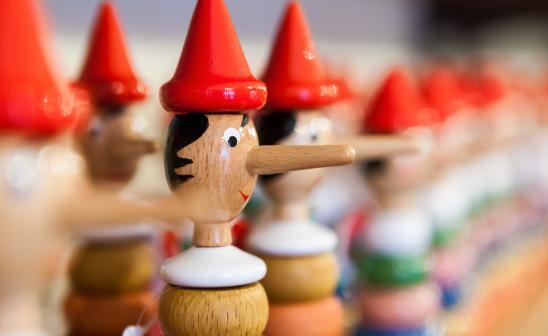Why some people lie to appear more honest

Study: People bend truth, even at personal monetary cost, to avoiding appearing dishonest
This story originally appeared on the UChicago News website. View the story on their site here.
Honesty is the best policy, or so the saying goes. But what if the truth seems less believable than a fib?
That’s the scenario explored in a new study co-authored by a leading University of Chicago psychologist, who found that—in certain cases—people will lie in order to appear more honest.
Asst. Prof. Alex Shaw and his fellow researchers found evidence that highly favorable circumstances can prompt people to fudge the truth, even at personal monetary cost.
Using a range of online experiments and interactive games, they discovered that people sometimes weigh the cost to their reputation more heavily than the cost to their pockets. For instance, a person who drives to work functions may underreport their mileage for expenses. A lawyer who works unusually high hours may bill fewer, to avoid making a client feel cheated. A winner of several consecutive coin flips may sprinkle in a few losses.
“We know that people lie to be nice to other people; that’s something people find to be acceptable,” said Shaw, an expert on the psychology of reputational management. “This is a slightly different thing: Your lie isn’t helping anyone else. You’re worried about appearing dishonest, so that causes you to lie in some circumstances.”
Shaw produced the study with lead author Shoham Choshen-Hillel, a former UChicago postdoctoral fellow now at the Hebrew University of Jerusalem. Another co-author was UCLA’s Eugene M. Caruso, a former faculty member at the University of Chicago Booth School of Business.
The study was published Jan. 30 in the Journal of Experimental Psychology.
In one experiment, the researchers asked 115 lawyers in Israel to imagine giving a client an estimate of 60 to 90 billable hours. Half of the participants were told that they actually worked 60 hours, while the other half were told they worked 90. The clients had no way to verify the hours.
On average, the 60-hours group reported working 62.5 hours, with 17% of respondents falsely inflating their time spent. The 90-hours group, however, reported an average of 88 hours—with 18% of respondents falsely underreporting how long they worked.
The researchers found similar results elsewhere. In another experiment with 149 undergraduate students in Israel, participants played online dice-rolling and coin-flipping games, winning $0.15 for each successful roll or flip that they reported. The games were rigged for half the students, ensuring them 12 wins in 12 tries.
Nearly a quarter of those participants underreported their wins, compared to just 4% of the control group.
“While our findings may seem counter-intuitive, I think most people will recognize a time in their lives when they were motivated to tell a lie to appear honest,” Choshen-Hillel said.
Choshen-Hillel acknowledged that real-world scenarios could produce different results, especially given higher monetary stakes. But she stressed that the costs of appearing dishonest in the lab are also much lower, which means that people would likely make similar calculations in their daily lives—weighing monetary and reputational incentives when deciding how to act.
Shaw hopes future research can uncover clearer boundaries between people who lie to protect their reputation for truthfulness and those who do so out of selfishness.
“It would be interesting to demonstrate that the people who are lying to appear honest are different from the people who are lying in self-interest—to demonstrate that those are very different kinds of motives,” he said.
Citation: “Lying to appear honest,” Choshen-Hillel et al., Journal of Experimental Psychology, Jan. 30, 2020.
 THE UNIVERSITY OF CHICAGO
THE UNIVERSITY OF CHICAGO

